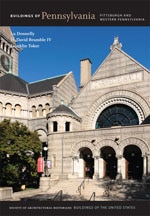You are here
Sunnyledge Hotel
James McClelland was a homeopathic doctor for Andrew Carnegie and the Frick, Mellon, and Scaife families. After rejecting a Queen Anne design for his house by a local architect, McClelland hired Longfellow, Alden and Harlow of Boston. The house sits easily on a narrow bench of land against a small hillside, which softens the bulky massing and austerity of the unadorned brick walls. The front elevation has a deeply inset arched door, irregularly spaced windows, and textured brickwork. Massive square chimneys with decorative brickwork and corbeling rise from the hipped roof. McClelland's medical office curves out at the northeast corner to form an oversized tower with conical roof. His patients entered through a separate porch with exposed rafters. Inside, the entrance hall is paneled in wood, and a forest of thin wooden spindles forms screens and the staircase banister. The spindles were fabricated simultaneously for Sunnyledge and Chicago's Glessner House, which the same firm completed after H. H. Richardson's sudden death in 1886.
The McClellands' younger daughter lived in Sunnyledge for ninety-four years, changing nothing. She endowed it as a private house museum, which would have had few equals for period authenticity, but her youthful curator survived her by very few years and the furnishings were auctioned. The family papers went to the Historical Society of Western Pennsylvania. Fortunately, when the home became a small hotel, the public rooms were kept intact, including samples of James McClelland's old medicine bottles from a century ago.
Writing Credits
If SAH Archipedia has been useful to you, please consider supporting it.
SAH Archipedia tells the story of the United States through its buildings, landscapes, and cities. This freely available resource empowers the public with authoritative knowledge that deepens their understanding and appreciation of the built environment. But the Society of Architectural Historians, which created SAH Archipedia with University of Virginia Press, needs your support to maintain the high-caliber research, writing, photography, cartography, editing, design, and programming that make SAH Archipedia a trusted online resource available to all who value the history of place, heritage tourism, and learning.















